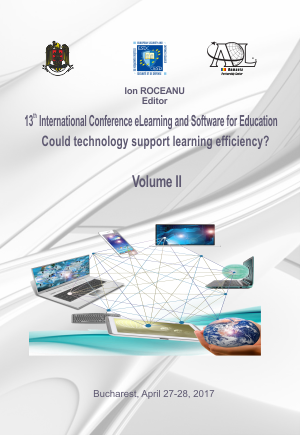ACCELERATED TEACHING AND LEARNING: ROLES AND CHALLENGES FOR LEARNERS AND TUTORS
ACCELERATED TEACHING AND LEARNING: ROLES AND CHALLENGES FOR LEARNERS AND TUTORS
Author(s): Dana Radler, Irina BocianuSubject(s): Social Sciences
Published by: Carol I National Defence University Publishing House
Keywords: accelerated learning; adult learning; ESP; personal development.
Summary/Abstract: In the last couple of decades, teaching methods expanded, being reformed, enhanced and often complemented by new technologies as a means to support student-centred activities. The current educational practice illustrates that the span of activities widely extends beyond core and optional disciplines, encouraging learners to make use of both formal and informal sources of instruction. Recent contributors discuss the role of accelerated learning models in terms of influences exerted upon adult education teacher motivation and assessment results (Wlodkowski, Kasworm 2003). In terms of participation and results, recent contributions indicate an ascending curve in what regards student attendance while highlighting the permanent need for guidance and support (Gingsberg and Wodlowski 2010). Educators and psychologists underline that accelerated learning methods require a more substantial preparation on behalf of trainers (Patricia Scott 2003), since materials need to balance “depth over breadth of learning” (Wodlowski 2010). This paper analyses the way in which accelerated learning works for undergraduate students at various business-related profiles where English is used based on an ESP approach. Accelerated learning is a two-sides oriented process which refers to two different approaches: timeframes and learning and teaching (Lee and Horsfall 2010). Under these circumstances, the focus of our paper is on how accelerated learning is done both in full attendance learning as well as distant learning courses (shorter periods of time), and also how faculty members can deal with this type of situations and how the teaching strategy adapts itself to this type of instruction. To better understand the accelerated learning process from the two points of view - the student and the instructor - in the current higher educational context in two major universities in Bucharest (University of Bucharest and the Bucharest University of Economic Studies), we have concentrated on a questionnaire targeting the following respondents: a) Non-working undergraduates focusing on the completion of their studies; b) Working undergraduates needing to balance efforts between part-time or full-time work and studies in the distant learning programs; and c) Teaching staff: practice and challenges in the current educational context. Under these circumstances, the questionnaire for our study case has been designed so that it collected a varied range of responses from both the students and the teachers, revealing thus the opinions in relation to accelerated learning techniques. As expected, some of the already employed students have appreciated the short duration of the courses and the problem-solving approach of the tasks used in the instruction process while the instructors have described the challenges of the accelerated learning teaching techniques and the difficulty/easiness in choosing the best teaching practices for the students in acquiring professional skills demanded by the current labour market. As a result, undergraduates and tutors feel the need to complement traditional means of instruction with fast-paced learning activities, through which they can build their expertise in a rather independent, accelerated way.
Journal: Conference proceedings of »eLearning and Software for Education« (eLSE)
- Issue Year: 13/2017
- Issue No: 02
- Page Range: 601-608
- Page Count: 8
- Language: English

